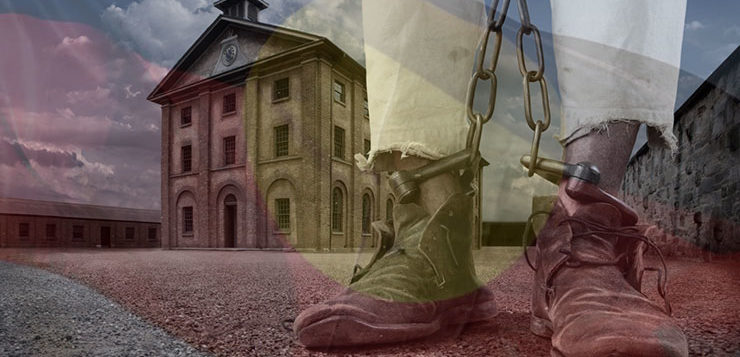DON’T MISS ANYTHING! ONE CLICK TO GET NEW MATILDA DELIVERED DIRECT TO YOUR INBOX, FREE!
On January 26, Alison Pennington reflects on the history of a nation defined by resistance and determination, but diverted by elite self-interest.
On this day a couple hundred years ago, Governor Arthur Philip placed a flag in the ground in Botany Bay and declared it a fitting place for a giant prison. Behind him, 10 more ships sardine-packed with convicts in derelict condition, military and civil officers, and some food stocks approach the shores. The arrival of the First Fleet was the arrival of an Ikea flatpack “do it yourself” prison colony.
January 26 – ‘Australia Day’ – is a political project forced upon the nation by born-to-rulers. They want consensus for the wealth amassed through theft of Aboriginal peoples’ land and resources, and through the convict transportation system of slave labour. We will hear stories of triumphant ‘discovery’, and ‘progress’, but this couldn’t be further from the truth.
So decrepit was the first New South Wales colony that the military controlled all economic activity (the Rum Corps) – a beacon of reaction against even liberal capitalists across the world.
Why on earth did the flatpack colony set up here? Eight years prior to the Fleet’s arrival Captain Cook (the bloke we have memorials for across the country) was given urgent orders by London to find suitable land to establish a penal colony. After hundreds of years of wreaking absolute havoc on the peoples of England, Ireland, Wales and Scotland, British prisons were bursting at the seams.
Crime was a construction of the empire – a new and experimental time for creating systems of control. Political dissidents, peasants and workers attempting to defend themselves since the Enclosures and now facing violent industrialisation, were locked up in their thousands for crimes of theft, treason, riot, incitement, seditious libel and more.
Many crimes were punishable by death. But with mass democratic movements for suffrage and political independence in full swing, the empire preferred transportation to avoid creating martyrs.
And this is why the Australian colony began – a dark organ of colonial discipline. Australia’s penchant for violent imprisonment is shamefully remnant today. Aboriginal people are incarcerated at a higher rate than black South Africans during apartheid. We lock up children in juvenile prisons. The system of refugee offshore detention is a “market” entirely created and managed by government. Serco is a modern-day East India Company.
But Australia’s history is one of almighty resistance too. We are one of the oldest democracies in the world. This history has been erased. Convicts, settlers, and political leaders – transported from leading mass movements – united and resisted when they arrived here. Our early labour movement was imbued with the spirit of revolutionary democracy, liberty, and republicanism. These values would come to stand-in for the values of this nation. But democracy was only ever partial until Aboriginal peoples obtained basic civil rights, and this fight for justice and self-determination continues today.
Lives got better on this land too. As modern Australia grew and prospered, people migrated en-masse to make a better life. Freed convicts built modest wealth through plots of land, and migrants toiled across many industries to improve their lot. Mobility is woven into Australia. But there are large numbers of Australians who never ascended – economically isolated and deprived for generations-on-end. And this is most true of our First Nations peoples.
We must understand Australia as a disciplinary state – its new system of class control was salt on the original wound of this nation. The original wound is the dispossession of Aboriginal peoples and the total destruction of their economies and systems of social organisation. We can never heal this wound and unite our disparate peoples without a political project that puts treaty, justice, and sovereignty for Aboriginal peoples front and centre.
We need a progressive movement for a colony that’s never been truly independent. Australia graduated from full British control to independent government in a process spanning federation in 1901 to the UK’s 1986 Australia Act.
But commanding control of our resources really just transferred new hands; 86% of Australian mining is foreign-owned and US and UK companies have the largest foreign ownership shares. Our democracy has been medalled with in this time too (never forget the Whitlam dismissal).
With mining and political institutions near fully integrated, Australia is fast becoming a giant quarry that exists to feed resources to the last vestiges of the global fossil-fuel economy.
To respond to our immediate challenges and save ourselves and our environment, we must heal our historic wounds. We must be able to answer the questions, “who are we?” And “what can we be proud of?”
Respect for our young, stumbling democracy can never be created through top-down-ordered pledges to this disciplinary rump of a state (take note Tanya Plibersek). Reclaiming our world-leading traditions in resistance can.
Australian values belong to anti-establishment, ground-up democracy told from the mouths of everyday people. It is the only way we have ever made progress, and the only path forward today.
Ed’s note: Alison is reading Tony Moore’s landmark book Death or Liberty documenting the stories of political prisoners sent as convicts to Australia, and recommends it to all.
BE PART OF THE SOLUTION: WE NEED YOUR HELP TO KEEP NEW MATILDA ALIVE. Click here to chip in through Paypal, or you can click here to access our GoFundMe campaign.
Donate To New Matilda
New Matilda is a small, independent media outlet. We survive through reader contributions, and never losing a lawsuit. If you got something from this article, giving something back helps us to continue speaking truth to power. Every little bit counts.




